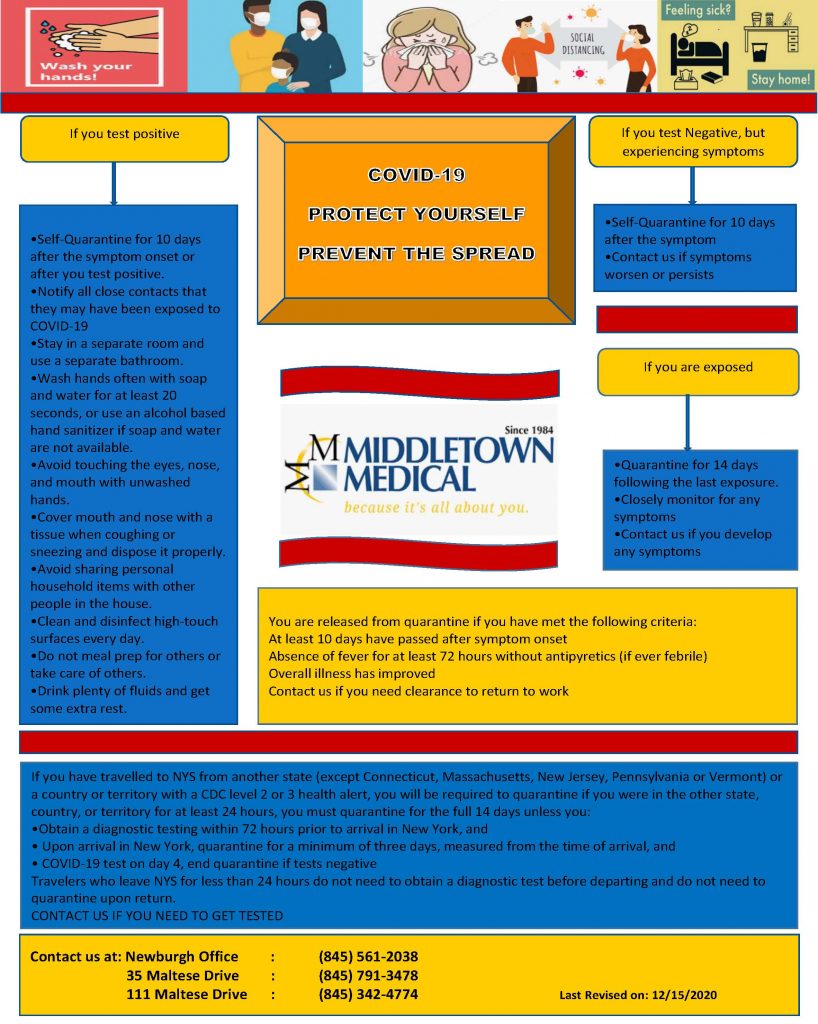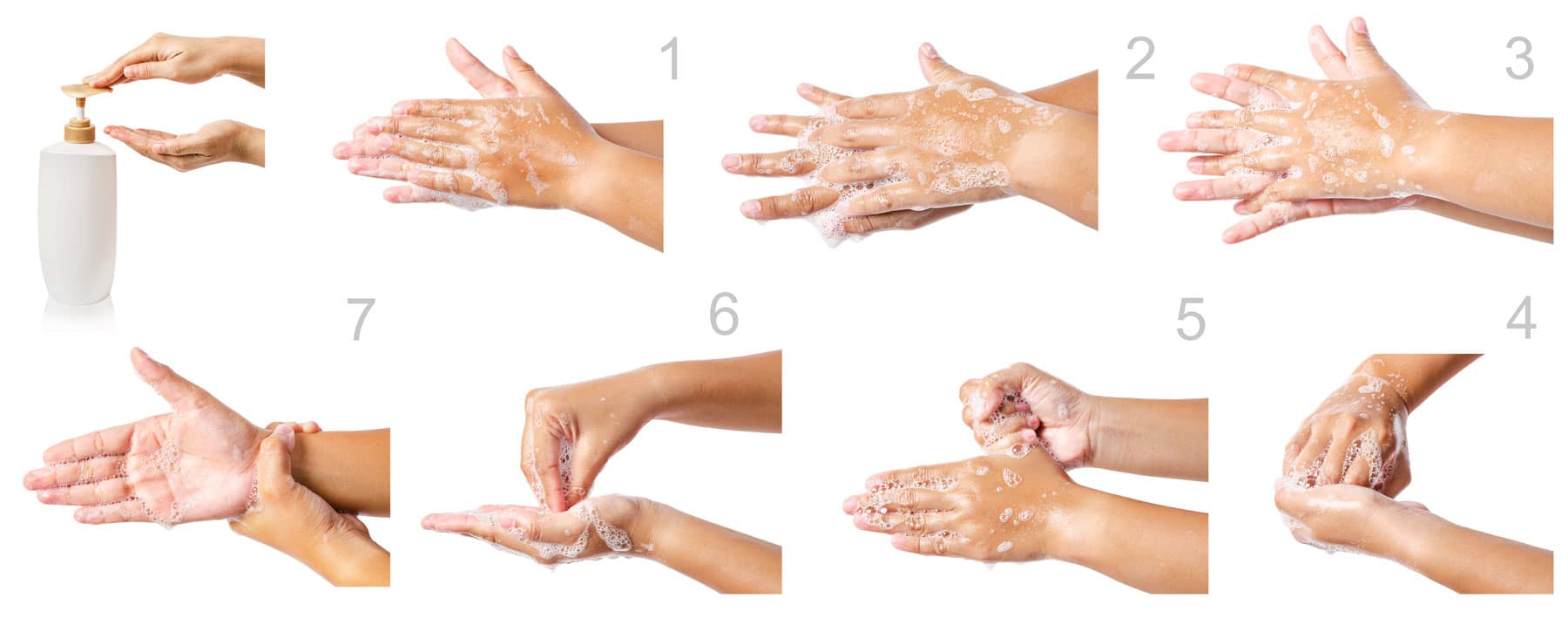CORONAVIRUS INFORMATION CENTER
CLICK HERE FOR INFORMATION ABOUT THE COVID-19 VACCINE
Middletown Medical has become a regional leader for COVID-19 response.
Learn more below about how our team has risen to meet the challenges of the past year, and how we are keeping patients safe and cared for.
COVID-19 FAQs
What is a novel coronavirus?
How does the virus spread?
- The virus that causes COVID-19 most commonly spreads between people who are in close contact with one another (within about 6 feet, or 2 arm lengths).
- It spreads through respiratory droplets or small particles, such as those in aerosols, produced when an infected person coughs, sneezes, sings, talks, or breathes.
- These particles can be inhaled into the nose, mouth, airways, and lungs and cause infection. This is thought to be the main way the virus spreads.
- Droplets can also land on surfaces and objects and be transferred by touch. A person may get COVID-19 by touching the surface or object that has the virus on it and then touching their own mouth, nose, or eyes. Spread from touching surfaces is not thought to be the main way the virus spreads.
- It is possible that COVID-19 may spread through the droplets and airborne particles that are formed when a person who has COVID-19 coughs, sneezes, sings, talks, or breathes. There is growing evidence that droplets and airborne particles can remain suspended in the air and be breathed in by others, and travel distances beyond 6 feet (for example, during choir practice, in restaurants, or in fitness classes). In general, indoor environments without good ventilation increase this risk.
COVID-19 seems to be spreading easily and sustainably in the community (“community spread”) in many affected geographic areas. Community spread means people have been infected with the virus in an area, including some who are not sure how or where they became infected.
What is community spread?
Community spread means people have been infected with the virus in an area, including some who are not sure how or where they became infected. Each health department determines community spread differently based on local conditions. For information on community spread in your area, please visit your health department’s website.
How can I protect myself?
- Wash your hands often
- Avoid close contact with people who are sick
- Maintain 6 feet of distance between yourself & people who don’t live in your household
- Cover your mouth and nose with a mask when around others
- Cover coughs and sneezes
- Clean and disinfect regularly
- Monitor your health daily
Is it safe to get care for my other medical conditions during this time?
- It is important to continue taking care of your health and wellness.
- Continue your medications, and do not change your treatment plan without talking to your healthcare provider.
- Continue to manage your disease the way your healthcare provider has told you.
- Have at least a 2-week supply of all prescription and non-prescription medications.
- Talk to your healthcare provider about whether your vaccinations are up-to-date.
- Call your healthcare provider
- if you have any concerns about your medical conditions, or if you get sick.
- to find out about different ways you can connect with your healthcare provider for chronic disease management or other conditions.
- Do not delay getting emergency care for your health problems or any health condition that requires immediate attention.
- If you need emergency help, call 911.
- Emergency departments have infection prevention plans to protect you from getting COVID-19 if you need care for your medical condition.
- Continue to practice everyday prevention. Wash your hands often, avoid close contact, wear a mask, cover coughs and sneezes, and clean and disinfect frequently touched surfaces often.
What should I do if I have had close contact with someone who has COVID-19?
- The best way to protect yourself and others is to stay home for 14 days if you think you’ve been exposed to someone who has COVID-19. Check your local health department’s website for information about options in your area to possibly shorten this quarantine period.
- Be alert for symptoms. Watch for fever, cough, shortness of breath, or other symptoms of COVID-19.
- If possible, stay away from others, especially people who are at higher risk for getting very sick from COVID-19.
View our helpful chart by clicking HERE or viewing below:

Should I get tested for COVID-19?
If you have symptoms of COVID-19 and want to get tested, contact Middletown Medical today. CDC has guidance for who should be tested, but decisions about testing are made by state and local health departments and healthcare providers.
To learn more about Middletown Medical’s COVID-19 testing, visit our Covid-19 Testing page.
MIDDLETOWN MEDICAL IS OPEN & SAFE
We are open and we are safe! Learn about all the ways we have implemented changes in order to protect our patients and staff:
✅ Telemedicine
We are continuing our Telemedicine program, and also now offer TeleMedicine for Urgent Care. Click here to learn more. Call (845) 342-4774 to set up a Telemedicine visit.
✅ Procedures
Our procedure suite is now open. If you have been putting off a needed medical procedure please inquire with your doctor for scheduling.
✅ Mask
We ask that each patient who comes into see us wear a mask or an appropriate face covering. Appropriate face covering is when the nose and mouth are covered.
✅ Remain In Car
We ask that unless it is a true hardship to the patient, all guests remain in their cars when a patient comes in for a procedure or a visit. You may be asked to wait in your car and to be called on your cell phone to come in for your visit to limit the number of patents in our waiting area. (this may vary based on the appointment time and location).
✅ Social Distancing
We have reduced the number of chairs in our waiting rooms and spaced them out to keep people safe.
✅ 3D Mammography
We have moved our 3D Mammography machine to 60 Dunning Road at our Gynecology Office in Suite 3, to make this more convenient for patients.
✅ No Outside Gloves
We ask that no gloves from outside be worn in the buildings. This is because anything you touch with the gloves can contaminate the next thing you touch. Washing hands and using hand sanitizer is the best.
✅ Temperature Check
All of our locations will check your temperature before you are admitted into the building.
✅ Drive-Thru Testing
We will maintain COVID-19 testing locations with drive-thru service. Click here for more info.
✅ Disinfection
All imaging equipment and patient rooms are cleaned after patients are seen with the appropriate sterilization supplies. We have also increased disinfection at all of our patient facilities to reduce the spread of germs.
✅ Sleep Study Reopened
During all of this stress, you may have had time to realize that you are not sleeping right. See one of our Pulmonologists to get a prescription to visit our advanced sleep lab today (click here).
✅ Temperature Check
All staff temperatures are checked before the beginning of each shift. Any staff member that is showing symptoms of illness is not permitted to work.
✅ Masks
All staff is required to wear a mask every day all day.
✅ Disinfection
All staff, including housekeeping, clean work areas throughout the day with the appropriate sterilization supplies.
✅ Medical Representatives
In an effort to reduce unnecessary public interactions at our facilities, no medical reps are welcome at this time.
Take steps to protect yourself
learn more at cdc.gov
Clean your hands often
- Wash your hands often with soap and water for at least 20 seconds especially after you have been in a public place, or after blowing your nose, coughing, or sneezing.
- If soap and water are not readily available, use a hand sanitizer that contains at least 60% alcohol. Cover all surfaces of your hands and rub them together until they feel dry.
- Avoid touching your eyes, nose, and mouth with unwashed hands.
how to PROPERLY WASH YOU HANDS ✋🤚👍

Important Links
cdc.gov
To get the latest coming from Centers for Disease Control and Prevention (CDC) visit their dedicated section for information regarding the Coronavirus.
health.ny.gov
To get the latest coming from New York, like the number of positive cases in which areas, visit their dedicated section regarding the Coronavirus.
https://www.health.ny.gov/diseases/communicable/coronavirus/
